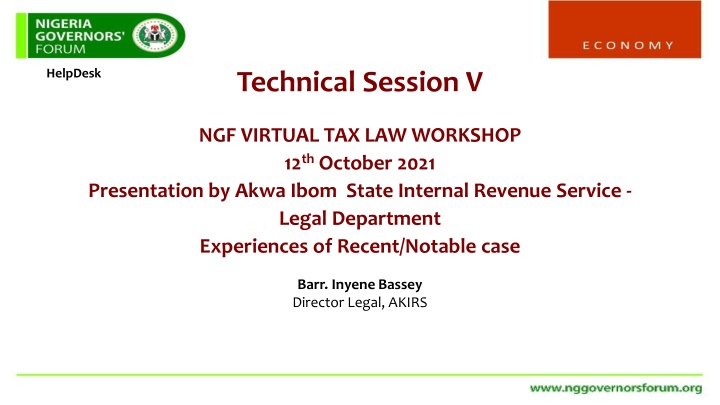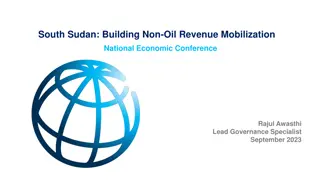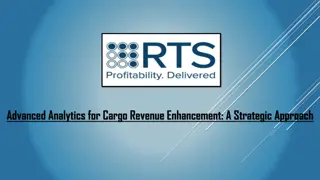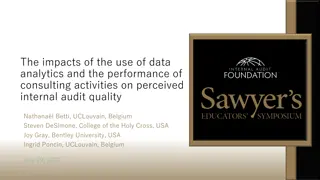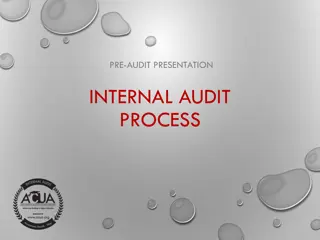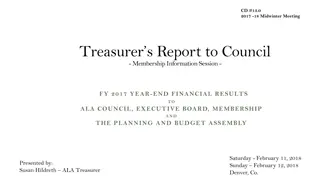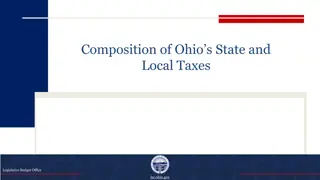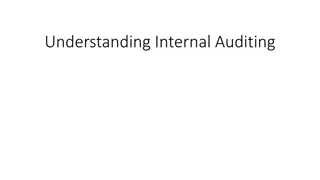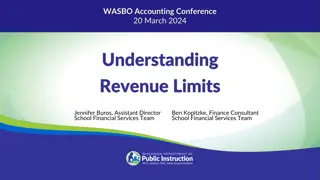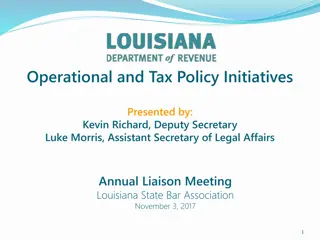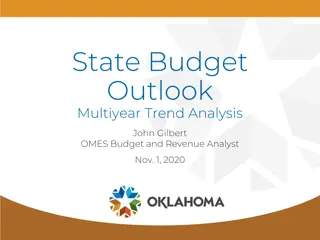Legal Case Analysis: Akwa Ibom State Internal Revenue Service v. Jumanwin Nigeria Limited
This legal case analysis delves into a notable state revenue case involving Akwa Ibom State Internal Revenue Service and Jumanwin Nigeria Limited. The case revolved around tax assessments, best judgment practices, and enforcement of tax liabilities. Key arguments, lessons learned, and judgments are highlighted, emphasizing the legal obligations and implications for taxpayers and relevant tax authorities.
Download Presentation

Please find below an Image/Link to download the presentation.
The content on the website is provided AS IS for your information and personal use only. It may not be sold, licensed, or shared on other websites without obtaining consent from the author.If you encounter any issues during the download, it is possible that the publisher has removed the file from their server.
You are allowed to download the files provided on this website for personal or commercial use, subject to the condition that they are used lawfully. All files are the property of their respective owners.
The content on the website is provided AS IS for your information and personal use only. It may not be sold, licensed, or shared on other websites without obtaining consent from the author.
E N D
Presentation Transcript
HelpDesk Technical Session V NGF VIRTUAL TAX LAW WORKSHOP 12th October 2021 Presentation by Akwa Ibom State Internal Revenue Service - Legal Department Experiences of Recent/Notable case Barr. Inyene Bassey Director Legal, AKIRS
HelpDesk What we will cover Notable State SIRS Legal case Brief statement of Facts of the case Key issue and judgement Key Arguments and Lessons learnt Ways colleagues in the SIRS can support the legal team
HelpDesk Notable State Revenue Legal case/ Statement of facts Charge No. REU/68c/2019: Akwa Ibom State Internal Revenue Service V. Jumanwin Nigeria Limited. Brief Statement of Facts: Jumanwin Nigeria Limited, (The Defendant) was: Served with Audit Notice which it rebuffed. Subsequently served with Demand Notice which it again ignored. Served with Final and Conclusive Notice upon expiration of statutory period for objection in respect of its Pay As You Earn, and other revenue subheads stipulated in relevant laws of Akwa Ibom State and its failure to file its PAYE Annual returns for 2012-2017. Upon service of a final and conclusive Demand Notice and subsequent effluxion of the statutorily allowed time for an objection, the Complainant (AKIRS) instituted an action against the Defendant in order to recover unremitted taxes accruable to the State Government.
HelpDesk Key Points and Judgement Charge No. REU/68c/2019: Akwa Ibom State Internal Revenue Service V. Jumanwin Nigeria Limited. Key Issue and Judgement It is pertinent to state that the assessment to which the Defendant was arraigned in court was based on Best of Judgment since the Defendant failed to afford the Tax Authority with its records to ascertain its actual tax liability. The case went through trial and judgment was delivered in favor of Akwa Ibom State Internal Revenue Service.
HelpDesk Key Arguments and Lessons Learnt Charge No. REU/68c/2019: Akwa Ibom State Internal Revenue Service V. Jumanwin Nigeria Limited. 1. Section 54(3) of Personal Income Tax Act (PITA) allows the relevant Tax Authority to use its best of judgment in assessing a taxable person who has failed to deliver its returns as provided for under the law. 2. Once the statutory period for raising an objection lapses, the best of judgment assessment becomes a legal liability that could be enforced in law. This has been upheld in several cases, to wit: In Saydoun Limited V. Edo State Board of Internal Revenue (2019) 4 TLRN 1, the Court held that; Where an employer fails to file the returns of its employees as required under Section 82(2) of the Personal Income Tax Act and Paragraph 10 of the Operation of Pay as You Earn Regulations to the relevant tax authority, the law empowers the relevant tax authority to resort to the Best of Judgment approach in assessing the income tax of such employees. The fact that there is no evidence to show that the Claimant actually filed the returns of its employees for the said 2006-2011, opened up the Claimant s employees to be assessed on the basis of Best of Judgment . 3. Again, in Lagos State Board of Internal Revenue V. Ecoserve Limited (2019) 40 TLRN 17, R. 3, the Court held that Failure to object to an assessment or the verdict of the appropriate tax authority or of the Tax Appeal Tribunal makes an assessment final and conclusive .
HelpDesk Key Arguments and Lessons Learnt Charge No. REU/68c/2019: Akwa Ibom State Internal Revenue Service V. Jumanwin Nigeria Limited. 4. Whether an objection to an assessment can be raised at the trial. It is pertinent to state here that the Personal Income Tax Act has created ample time for taxpayers to raise all objections and observations they may have about their tax assessment, however, where a taxpayer fails or refuses to make use of this opportunity, he cannot raise the objection on trial. 5. Conversely, in Shell Nigeria E&P Limited V. Lagos State Board of Internal Revenue (2019) 41 TLRN 30, it was held that where a valid objection is raised by the taxpayer within the time allowed by law, the Demand Notice raised in that respect shall not be final and conclusive. Therefore, a demand notice invariably becomes final and conclusive where a valid objection has not been raised by the taxpayer. In this case, the Defendant failed/neglected to comply with the provisions of Section 58 of PITA, therefore the demand notice had become final and conclusive. Section 66 of the Personal Income Tax Act provides that where no valid objection or appeal has been lodged within thirty days of the receipt of a demand notice, an assessment becomes final and conclusive.
HelpDesk The Key Learning The outcome of the statutes, and case law is that once an assessment has become final and conclusive, it becomes a legal liability liable to be enforced through the instrumentalities of the law. But the SIRS must have followed the legal steps required and crossed all their t s and dotted all their i s
HelpDesk Ways Colleagues in the SIRS can Support the Legal Team Tax officers can frustrate both the leal team, and their cases, if they do not take account of these common failures: Sometimes case files are submitted to the legal team without corresponding documents to assist the legal team prosecute the case. It is suggested that case files should be submitted together with necessary documents, e.g., Audit Notice, Demand Notice, Final and Conclusive Notice and Notice of Refusal to Amend, where applicable. Submission of case files without supporting documents. Once the issue of non-service arises, it beholds on the tax authority to prove that it was indeed served. This could be done by providing proof of delivery (if service was effected via courier) or evidence of acknowledgment of receipt from the process server. No proof of service of the requisite notice.
HelpDesk Thank you
